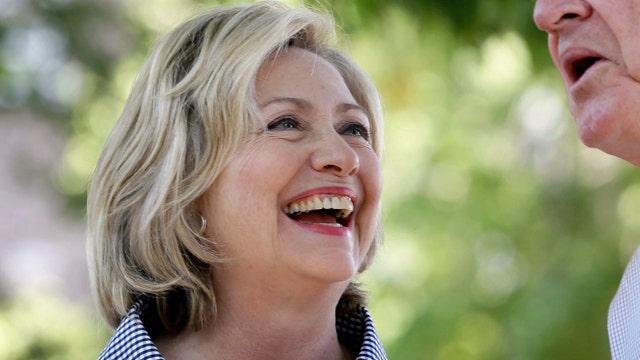Hillary Clinton laughing off email scandal?
Report: Number of Clinton emails flagged as 'classified' grows to 60
Ex-officials who were prosecuted and had their lives upended for allegedly mishandling sensitive records are accusing the Obama administration of a "double-standard" in its approach to the Hillary Clinton email scandal.
This administration has charged more people under the Espionage Act, a World War I-era law once used to go after major breaches, than any other in history. While the FBI is looking into Clinton's server amid revelations of state secrets potentially passing through it, some critics -- including those charged under that act -- doubt the Democratic presidential candidate will get the same treatment.
"It's a double standard," said John Kiriakou, a former CIA counter-terrorism operative who spent two years in federal prison and three additional months under house arrest this year for leaking the name of a covert CIA official involved in "enhanced interrogation techniques."
Clinton is not accused of leaking. But the common thread in these cases is the handling of classified material. And the slow-moving arc of the email scandal -- marked by a trickle of revelations along with a web of evolving explanations -- stands in stark contrast to past cases where leakers and whistleblowers were punished aggressively.
Kiriakou, one of those defendants, sees different treatment for the Democratic powerhouse who led the State Department.
"The FBI is going to investigate [Hillary Clinton], but it is not up to them," he told FoxNews.com.
"If they [the FBI] want to charge Hillary Clinton with a crime, they can certainly find a crime with which to charge her," he added. "But there is no way the Obama administration is going to prosecute her. No way."
Thomas Drake, a former NSA official who after 9/11 went to Congress to sound the alarms about what he called unconstitutional surveillance, also says there is a double standard when it comes to applying classification law.
"I got hammered good," Drake told FoxNews.com.
Though the government's Espionage Act case against him fell apart in 2011, Drake practically lost everything and faced a mountain of legal bills. He pleaded to a single misdemeanor for "exceeding authorized use of a government computer," a violation he compares to "spitting on the NSA sidewalk."
"I think [Clinton] is vulnerable, but whether she enjoys what I call 'elite immunity,' we don't know," he said. "For much lesser violations people have lost their jobs. But when you get to the higher ranks, it's like another set of rules."
Since Obama took office in 2009, seven people have been charged under the Espionage Act -- all for leaking classified or sensitive information. Five -- Kiriakou, Shamai Leibowitz, Chelsea (previously Bradley) Manning, Jeffrey Sterling, and former State Department official Stephen Kim -- got jail time.
Kim pleaded guilty in 2014 to disclosing a classified report on North Korea to Fox News reporter James Rosen. His lawyer said the information at issue "was less sensitive or surprising than much of what we read in the newspaper every day." He did 13 months in prison. Sterling was sentenced to three-and-a-half years in May for revealing classified information about the CIA's effort to disrupt Iran's nuclear program to journalist James Risen. Edward Snowden, who leaked hundreds of thousands of documents on government surveillance, has been charged in absentia but has asylum in Russia.
Whether Clinton will get "hammered" is another question. According to reports, the FBI took possession of Clinton's private server last week. The IG for the intelligence community told members of Congress that at least two emails that traversed the device while she was secretary of state contained information that warranted a "top secret" label.
Clinton and her staff have been adamant that no email marked classified at the time was ever circulated through her email address or server. "She viewed classified materials in hard copy in her office or via other secure means while traveling, not on email," campaign Communications Director Jennifer Palmieri said in an email to supporters.
In his case, Kiriakou was charged with violating the Intelligence Identities Protection Act, two counts of espionage, and making false statements to the CIA Publications Review Board when writing his book, "The Reluctant Spy." All but the first charge were dropped. He pleaded guilty in exchange for a lesser sentence. But his wife, a top CIA officer, was pushed out of her job. With three children at home, the family went on welfare while Kiriakou was in prison, and fundraisers helped pay the mortgage on their Arlington, Va., home.
To this day, his lawyer, Jesselyn Radack, insists the name of the agent was already well known among the media and human rights community and was never published. Radack told FoxNews.com the Clinton case is "certainly indicative of the hypocritical double standard in Espionage Act prosecutions brought against low-level employee versus politically-connected people." She also lamented "over-classification" and called the Espionage Act an "ill-fitting tool" in these cases.
According to The Washington Post, the Clinton investigation is now being overseen by at least one prosecutor in the case of former Gen. David Petraeus. Petraeus was charged with keeping classified information at home in the form of secret "black books." He was given a two-year probation and a $100,000 fine, and today, reportedly is consulting with the White House on ISIS and Iraq and is the chairman of the KKR Global Institute.
Drake, on the other hand, now works at an Apple Store.
"They aren't going to treat [Clinton] the same way I was treated for sure," he said.













































